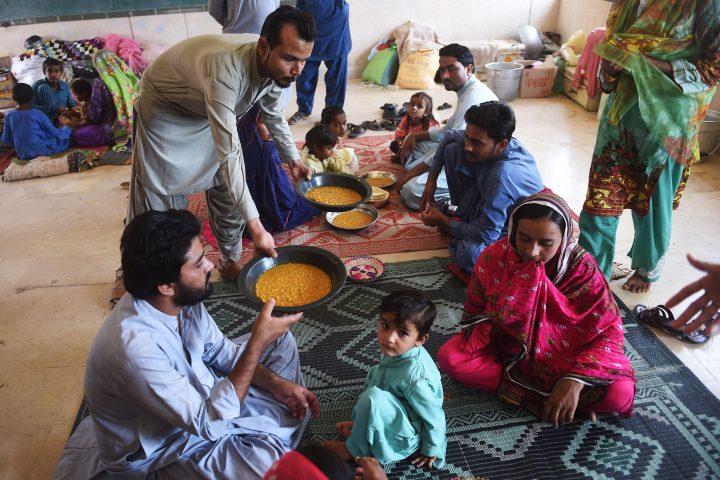Living thousands of miles away, Calgary resident Ahmer Memon is constantly worrying about family in Pakistan affected by record-breaking floods that have wreaked havoc across the country.

“Every day, we are spending half a day on the telephone, asking about the well-being of our people over there, how they are coping,” said Memon, past president of the Pakistan Canada Association (PCA) Calgary.
A joint fundraiser started over the weekend by PCA Calgary, Muslim Doctors International and the Islamic Relief Canada raised nearly $50,000 within the first two days.
Memon, who is part of a large but close-knit Pakistani community of roughly 35,000 in Calgary, said the groups will continue to raise funds to purchase medication in bulk and other supplies like large tents where families may need to live for several months while rebuilding.
Weeks of unprecedented monsoon rains in Pakistan have killed more than 1,160 people and left millions homeless since mid-June.
More than 33 million people, or one in seven Pakistanis, have been affected by the catastrophic flooding, which has devastated a country already trying to revive a struggling economy.
Memon, like many others in Canada, has been keeping a close eye on the crisis that has seen more than one million homes damaged or destroyed in the past two and half months.
“This flood did not discriminate between the poor and the rich because there is water everywhere — roads and villages have been cut off from food supplies,” he said.

Besides various online fundraisers and Canadian charities working on the ground, the Pakistani community in Canada is also collecting donations at mosques and sending them to their relatives through bank transfers.
Mississauga, Ont., resident Mohammed Saquib Shaikh, who is originally from Karachi, said family, friends and teachers from different parts of Pakistan have been personally reaching out to seek help.

Get daily National news
There is an urgent need for clothing and food supplies, he has been told.

In the suburbs of the southern city of Karachi, one of the walls of his aunts’ house that they helped build collapsed in the torrential rain. And earlier Tuesday morning, a friend from Balochistan said support has been lacking in the province.
“It’s definitely really devastating and sad to see,” the 35-year-old said.
On a personal level, Shaikh is trying to send money directly to people who need it most and is reaching out to his Pakistani circle in Canada to do the same.
International aid for Pakistan
With an estimated US$10 billion in damage to the Pakistani economy, international relief efforts are underway.
On Monday, Canada announced $5 million in funding to help “scale up” the humanitarian response. On Tuesday, the U.S. government said it would provide US$30 million in assistance to help victims of the flood.
The United Nations and Pakistan issued an appeal Tuesday for $160 million in emergency funding to aid flood victims.
Mahmood Qasim, who recently returned from the flood-affected areas in the provinces of Balochistan and Sindh, said access to the under-developed scattered communities was a main concern.
“The devastation is at a very, very large scale,” said Qasim, CEO of International Development and Relief Foundation (IDRF), a Canadian registered charity.
“Families are completely displaced, they’ve lost their livestock, they don’t have their homes because a lot of them in the rural villages are living in mud homes and it’s also impacted their livelihood.”
Working with local teams in Khyber Pakhtunkhwa, Punjab, Baluchistan and Sindh, IDRF is currently providing families with emergency food boxes and kits, which contain basic hygiene items, water filtration systems, sleeping and cooking supplies, Qasim said.
So far, the non-profit has allocated close to $1 million.
“Everybody around the world needs to step up and help out as much as we can.”
ICNA Relief Canada, which has a local partner in Pakistan, is also helping with relief efforts in southwestern Balochistan, Sindh and eastern Punjab.
With roughly half a million dollars sent, volunteers and staff on the ground are distributing water, medicines, safety kits and tents for temporary rehabilitation, said Syed Agha, senior director for co-ordination and administration at ICNA Relief Canada.
“It’s a real calamity that we need to address,” said Mohammad Ijaz, president of ICNA Relief Canada, urging Canadians to donate generously.
With more monsoon rains expected and a lack of clean drinking water, concerns are also growing over mosquito- and water-borne diseases.
The National Disaster Management Authority on Tuesday warned emergency services to be on maximum alert, saying floodwaters over the next 24 hours could cause further damage.
— with files from Global News’ Elissa Carpenter, The Associated Press










Comments
Want to discuss? Please read our Commenting Policy first.